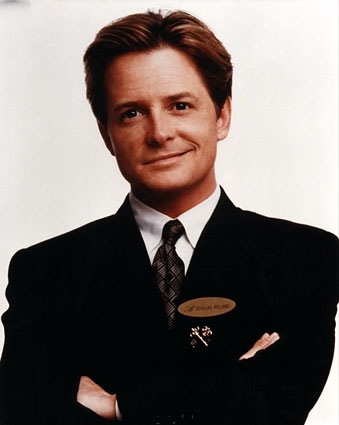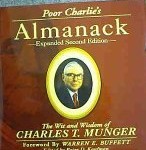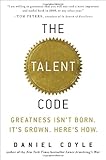57 Meditations on Kicking @$$ in Business and Life"4.8/5 stars" on Amazon
Business Is Like A Decathlon: Be Decent At These 10 Things & You’ll Win The Gold!
Tweet 1 CommentI’d love to see your face on a box of Wheaties.
The Olympic decathlon — a combined event of 10 different track and field races — is a perfect metaphor for business.

Bruce Jenner didn't have to win every one of the 10 races in the Olympic decathlon to win the gold.
You can actually win the decathlon without being the best at any of the 10 races.
In fact, Bruce Jenner (winner of the 1976 Olympic Decathlon and pictured on the Wheaties box) averaged the equivalent of a little better than 3rd place in each race — and he still won the decathlon by a substantial margin.
Inspired by the decathlon metaphor, here is a 10-item checklist for succeeding in business…if you train to place in these 10 business races, you can win the business gold. …
1 comment so far | Continue Reading »
Tuesday, March 8th, 2011
12 Of My Favorite Quotes on Success
Tweet 1 CommentI got positive feedback from the Awesome Chinese Proverbs posting and have since been looking out for other good quotes and sayings in various categories.
This posting of quotes on success was inspired by “Vegas Steve” — thanks for the inspiration from your Dare to Dream collection of quotes!

1) “Eighty percent of success is showing up.” — Woody Allen
2) “Many of life’s failures are people who did not realize how close they were to success when they gave up.” — Thomas A. Edison
3) “Once you make a decision, the universe conspires to make it happen.” — Ralph Waldo Emerson
4) “Whenever I hear, ‘It can’t be done,” I know I’m close to success.” — Michael Flatley
5) “Losers visualize the penalties of failure. Winners visualize the rewards of success.” — Dr. Rob Gilbert
6) “Success is not the result of spontaneous combustion. You must set yourself on fire.” — Reggie Leach
7) “Always bear in mind that your own resolution to succeed is more important than any one thing.” — Abraham Lincoln
8) “Victorious warriors win first and then go to war, while defeated warriors go to war first and then seek to win.” — Sun-tzu
9) “You may have to fight a battle more than once to win it.” — Margaret Thatcher
10) “If you get up the courage to begin, you have the courage to succeed.” — David Viscott
11) “Success is simply a matter of luck. Ask any failure. — Earl Watson
12) “Success is peace of mind which is a direct result of self-satisfaction in knowing that you did your best to become the best that you are capable of becoming.” — John Wooden
If you want to see all the lists of quotes I’m compiling, you can click my Quotes section.
1 comment so far | Continue Reading »
Saturday, February 19th, 2011
The 20 Best Business Books Of All Time
Tweet 3 CommentsMy brother-in-law Rich recently asked me for my favorite business book. I had a tough time answering because a slew of book titles raced through my mind.
Well, make room on your bookshelf because I dove in and came up with 20 top business books below:
The Best Business Books Of All Time
1) Poor Charlie’s Almanack

If I had to pick just one business book for folks to read, it would be this illustrated tome by Charlie Munger — Warren Buffett’s long-time right-hand man — with its folksy and entertaining tales of business and life (see Charlie Munger Quotes for a taste).
There’s plenty of Buffett tips in here too so you get two-for-one! …
3 comments so far (is that a lot?) | Continue Reading »
Saturday, June 5th, 2010
The Top 10 “John Wooden” Searches On My Blog
Tweet 2 CommentsMy John Wooden Series is receiving a bunch of traffic these days after his recent death.
I always look at what keywords people search on to make sure I’m doing my best to provide good resources on them.
Towards that end, here are the top 10 John Wooden searche phrases (in quotes below) that I’m receiving, along with relevant links/answers:
- “john wooden quotes” — Here’s a good list of Wooden quotes (along with how many people like each one)
- “john wooden 7 principles” — This refers to the “7 Things To Do” that Wooden’s father taught him
- “john wooden steps to success” — Here’s my post on Wooden’s 8 Steps To Success
- “pyramid of success john wooden” — Here’s a cool image of Wooden’s Pyramid with
- “bill gates and john wooden” — my old colleague Bob Evans of Information Week wrote here that “Bill had a basketball autographed by John Wooden, the legendary UCLA basketball coach and a master strategist himself. I asked about the ball and Bill’s feelings toward Coach Wooden, but Bill just smiled and said we’d have to get to that another time.”)
- “john wooden records” (the best listing I can find of John Wooden’s records appears on this “John Wooden: A Coaching Legend Page at UCLABruins.com)
- “drink deeply in books’-wooden” (this is from Wooden’s father’s list of “Seven Things To Do” — the exact wording is “Drink deeply from good books, especially the bible.”)
- “best john wooden book for teenagers” — I believe that “Wooden: A Lifetime of Observations and Reflections On and Off The Court” is the best Wooden book for teenagers
- “charlie rose interviews john wooden” — Here’s a link to Charlie interviewing Wooden!
- “john wooden personality type” — I researched this and found out that he is likely an ENFJ and Enneagram Type 1
As you know, John Wooden is a hero of mine — if there’s anything else you’d like to know about him, please comment below.
2 comments so far (is that a lot?) | Continue Reading »
Friday, June 4th, 2010
John Wooden Quotes From “Pyramid of Success”
Tweet 5 Comments[This is part of a John Wooden Leadership Series I’m doing celebrating his 100th year of life]
The following is excerpted from John Wooden’s amazing book The Pyramid of Success.
He begins with this overall quote:
“Success is peace of mind which is a direct result of self-satisfaction in knowing that you did your best to become the best that you are capable of becoming.”
And here are Wooden’s 15 “Building Blocks” of the Pyramid of Success along with quotes on each:
1) Industriousness — “There is no substitute for hard work. Worthwhile results come from hard work and careful planning.”
2) Enthusiasm — “Enthusiasm brushes off upon those with whom you come in contact. You must truly enjoy what you are doing.”
3) Friendship — “Friendship comes from mutual esteem, respect and devotion. Like marriage, it must not be taken for granted but requires a joint effort.”
4) Cooperation — “Cooperate with all levels of your co-workers. Listen if you want to be heard. Be interested in finding the best way, not in having your way.”
5) Loyalty — “Loyalty to yourself and to all those depending upon you. Keep your self-respect.”
6) Self-Control — “Practice self-discipline and keep emotions under control. Good judgment and common sense are essential.”
7) Alertness — “Be observing constantly. Stay open-minded. Be eager to learn and improve.”
8) Initiative — “Cultivate the ability to make decisions and think alone. Do not be afraid of failure, but learn from it.”
9) Intentness — “Set a realistic goal. Concentrate on its achievement by resisting all temptations and being determined and persistent.”
10) Condition — “Mental-Moral-Physical. Rest, exercise and diet must be considered. Moderation must be practiced. Dissipation must be eliminated.”
11) Skill — “A knowledge of and the ability to properly and quickly execute the fundamentals. Be prepared and cover every little detail.”
12) Team Spirit — “A genuine consideration for others. An eagerness to sacrifice personal interests of glory for the welfare of all.”
13) Poise — “Just being yourself. Being at ease in any situation. Never fighting yourself.”
14) Confidence — “Respect without fear. May come from being prepared and keeping all things in proper perspective.”
15) Competitive Greatness — “Be at your best when your best is needed. Enjoyment of a difficult challenge. “
5 comments so far (is that a lot?) | Continue Reading »
Sunday, May 23rd, 2010
7 Tips On How To Motivate Your Team (Hint: Make Them Feel "Progress")
Tweet 4 CommentsA feeling of “progress” may be the most important motivator for you or your team, according to a Harvard Business Review study on what motivates people (thanks to my colleague Mary for pointing this one out).
The HBR study took an interesting angle on motivation by studying hundreds of workers and digging into what happens on a great work day.

The gist of the study is that on days when workers feel like they’re making progress on projects their emotions are positive and that increases their drive to succeed.
The opposite is true: when workers are feeling like they’re on the “hamster wheel,” working hard with little in the way of results, they feel negative emotions and their performance plummets.
And the progress that your team feels can even be small…and they’ll still feel motivated!
7 Tips For How To Motivate Your Team Through Progress
1) Set SMART Goals
To motivate your team through the feeling of progress, you’re gonna first need to work with them to set goals.
The goals you set should be SMART Goals:
- Specific — Well defined, clear to everyone
- Measurable — There should be a metric or some measurement to identify how you’re progressing on your goal.
- Agreed-Upon — The goal should be agreed upon by the people working on it.
- Realistic — The goal can be ambitious but should be within reason
- Time-based — Every goal should have a time-line.
2) Provide Resources Necessary to Achieve Goals
You as a leader should do whatever you can to provide the resources necessary for your team to work on reaching goals.
Spend 1-on-1 time with them to discuss the goals and ask them what they need to reach them.
3) Hold Frequent Meetings To Chunk Down Goals
Let’s say you’ve got your team’s quarterly goals in place.
Now you’re gonna want to set up frequent meetings within the quarter to discuss them.
I recommend that you meet with your team either daily (or every other day) (see Daily Huddle).
In those huddles, ask your direct report to list things that they could do in THAT WEEK to make progress on the quarterly priorities.
E.g. If your quarterly goal is to close a major partnership with a single Fortune 100 customer, then ask your direct report at the start of a week what is it that they can commit to doing to moving that priority forward.
Example of chunking down the quarterly goal:
- If it’s the beginning of the quarter, the first week’s goal may be as simple as committing to identifying the 10 Fortune 100 customers your direct report is going to go after.
- The following week’s goal may be to telephone a contact at each of the ten Fortune 100 customers.
- In the week after that, your direct report may agree to commit to making a proposal to a certain Fortune 100 customer.
- Etc.
Now, as your direct report makes headway on these chunked-down goals, they will have a feeling of progress.
Remember this nugget of wisdom from my business hero Coach John Wooden (I’m paraphrasing):
Progress is not necessarily reaching your goal…progress is working as hard as you reasonably can on your goal and then letting the results be what they may.
4) Celebrate Milestones
When you reach your goals (i.e. milestones), take a moment to celebrate.
Acknowledge each and every person involved in the project…ideally with specifics on what they contributed to its success.
As a CEO, I ask my team to remind me of whenever anyone does something impressive…and then I try to write a quick congratulatory note to that team member (cc:ing their manager).
5) Acknowledge Failure As Progress
Don’t forget that failure is progress.
For example, your team may have a goal of trying to close certain types of customers or partnerships. If you explore one such deal and it’s not a good fit (for you or the other party), that is still progress.
Remember the old adage about the vacuum salesperson who realizes he has to knock on 50 doors before he makes a sale of one $50 vaccum:
“Each failure (closed door) is worth a dollar!” (because he gets $50 for knocking on 50 doors)
So when someone slams the door shut on a component of your goals, just move on — cuz you’re that much closer to getting what you want.
6) Be Authentic
This one’s easy: your praise of people should always be authentic.
Don’t tell someone they “really moved the ball forward” when you actually don’t know what they did.
7) Be Decisive
If you as a leader are indecisive about decisions around goals and priorities then you delay the feeling of progress that your team gets when they either reach (or fail to reach) their goal.
Progress is tough to feel when leadership is wishy-washy.
So be decisive about such things as:
- Setting goals
- Providing resources to help the goals get reached
- Pulling the plug on deals/losing deals (once in awhile you will either want to pull the plug on a deal or you will have it pulled for you by another party — this is ok, just make it fast).
If you can work on the above 7 tips, you will help motivate your team though progress.
4 comments so far (is that a lot?) | Continue Reading »
Friday, April 30th, 2010
3 Tips To Developing Your Talent (From The World’s Secret Talent Hotbeds)
Tweet 1 CommentI just finished reading an amazing book called The Talent Code (I recommend it to any person wanting to further develop their talent).
The author Daniel Coyle visited the the talent development programs responsible for some of the top talent in the world, such as:
- Moscow for tennis
- Soccer in Sao Paolo, Brazil
- Dallas, Texas for a vocal studio
- A music academy in New York’s Adirondacks
- Baseball in the Caribbean
But you don’t have to attend one of these talent pools to improve yourself.
Coyle says that the key to talent development is a neural insulator that we all have inside us called myelin.
He argues that every human skill — whether its leadership, computer programming, sports, music or anything else — is created by chains of nerve fibers carrying signals.
And it is myelin that wraps layers around these fibers…and there are certain things we can do to increase the thickness of this myelin, resulting in faster and more accurate movement and thoughts.
He recommends a few approaches to increasing your myelin (and thus your talent).
The 3 Keys To Talent Development
1) Deep Practice
Focus your practice on repeating core skills, attend to your mistakes, practice those skills again.
“Struggle is not an option: it’s a biological requirement.”
The “Ten-Year, Ten-Thousand Hour Rule” is indeed valid — This finding from 1899 stated that world-class expertise in every domain (whether it’s cello, chess or tennis) requires roughly a decade or 10,000 hours (that would be about 3 hours a day, every day for a decade).
It’s the Ten-year rule that is often used in developing talent in young people (many parents try to time the beginning of a child’s practice of a skill to be about 10 years before that child will peak physically.
That’s why some children are best to start practicing certain skills when they’re 5 to 10 years old).
Did you know that comedian Jerry Seinfeld practiced his first Tonight Show set 200 times beforehand, according to this awesome profile of Seinfeld in the New York Times.
Overall, Coyle identifies three tips for improving practice:
- Chunk it Down — Break down the components of the skills into as many parts as you can (and practice those slowly).
- Repetition — Repeat the chunked-down components around three hours a day.
- “Feel It” — You should feel in tune with what you’re practicing, especially to identify the mistakes you make (so as to immediately work on correcting them).
2) Ignition
Coyle points out that ignition is key to developing talents — it’s a secret source of energy that we can tap into.
Some examples:
“I Want To Be Like Them”
There are examples of entire countries being “ignited” by the display of talent of one individual.
For example, in South Korea’s case it was on May 18th, 1998 when Se Ri Pak won the McDonald’s LPGA Championship — she was the first to do so from her country.
Pak “ignited” many women in her country as shown by stats over the following 10 years later: by 2007, 45 players from South Korean had one about one-third of the LPGA Tour events.
Anna Kournikova is Coyle’s other example of “I want to be like them.”
That same summer of 1998, Kournikova reached the Wimbledon semifinals and became an overnight sensation (her good looks certainly helped).
Russia was ignited and within 10 years the World Tennis Association Top 100 was home to five times as many Russian tennis players.
“Primal Cues”
Ignition can come in other forms — one study showed that an extremely high percentage of political leaders (Ghandi, Caesar, Napoleon, Bill Clinton) had one thing in common: they had lost their parents at a very early age.
Coyle reasons that the leader group’s loss of a parent triggered a primal cue that they were no longer safe…and that unlocked a massive energy source for them to tap into.
He points out that of history’s fastest runners, for example, they were on average the fourth child of 4.6 children — in other words, there is a pattern of the younger you are in your family, the faster you can run.
In this case, the primal cue is” You’re behind, better keep up!”
3) Master Coaches
Finally, Coyle says that a “master coach” is key to developing talent.
He says that a master coach possesses the following virtues:
- Vast knowledge
- Perceptiveness
- A habit of providing short and rapid feedback
- High moral standards (honesty)
I was thrilled that Coyle identified John Wooden, my favorite coach/teacher, as an example of a master coach.
I hope you enjoyed these highlights on developing talents…but I only just scratch the surface of Coyle’s amazing book.
Buy/read it!
1 comment so far | Continue Reading »
Monday, April 26th, 2010
Eight Steps To Success By John Wooden
Tweet 2 CommentsIn honor of John Wooden turning 100 this year, I’m doing a series on Wooden including tips for success.
Here’s his “Eight Suggestions for Succeeding” from Wooden: A Lifetime of Observations And Reflections On And Off The Court (which I highly recommend you read!).
- Fear no opponent. Respect every opponent.
- Remember, it’s the perfection of the smallest details that make big things happen.
- Keep in mind that hustle makes up for many a mistake.
- Be more interested in character than reputation.
- Be quick, but don’t hurry.
- Understand that the harder you work, the more luck you will get.
- Know that valid self-analysis is crucial for improvement.
- Remember that there is no substitute for hard work and careful planning. Failing to prepare is preparing to fail



